Critical and Exegetical Commentary on the New Testament (21 vols.)
Digital Logos Edition
Overview
Known as "Meyer's Commentary," the Critical and Exegetical Commentary on the New Testament (21 vols.) is considered one of the best New Testament commentaries published in English in the early nineteenth century. Heinrich August Wilhelm Meyer, a German Protestant with a gift for languages, published the first commentary in this collection in 1832 at the age of thirty-two. It would be a lifelong project, one he worked on concurrently with a busy pastorate and raising a family.
Known to have an encyclopedic memory and an appetite for buying books, it was not uncommon for Meyer to be reading his contemporaries in his native German, but also in English, Dutch, and French—languages that came as natural to him as Greek, Latin, and even Gothic. For over forty years Meyer balanced working on new additions to the commentary collection while also updating those already published with multiple, serious revisions. Before passing the baton to a few of his trusted peers to finish the NT, Meyer had completed sixteen volumes.
The Critical and Exegetical Commentary on the New Testament (21 vols.) includes the sixteen volumes by Meyer, two by Gottlieb Lünemann, three by Joh. Ed. Huther, and the final work on the Revelation of John by Friedrich Düsterdieck. Each book of the Bible is amply introduced, including biographical information about the authors, authorship controversies, information about the times of its composition, its intended audience, and more. Each volume focuses on the Greek text, and Meyer uses and discusses an abundance of sources and authors to illustrate meaning derived from the text. Meyer also likes to include important bibliographic material which was integral to his studies and research.
Want to learn Greek, or simply need a refresher? Check out Learn to Use Biblical Greek and Hebrew with Logos Bible Software!
This title is included in the following collections
You can save when you purchase this product as part of a collection.
Logos 8 Lutheran Platinum Lega...
$1,499.99$1,499.99Logos 6 Platinum Legacy Librar...
$1,499.99$1,499.99Logos 9 Lutheran Platinum Lega...
$1,499.99$1,499.992025 Researcher Diamond Librar...
$2,999.99$2,249.99
- $3,149.99$2,677.49
- $2,999.99
- $2,999.99
- $2,999.99
- $4,749.99$3,562.49
- $4,749.99$3,562.49
- $4,749.99$3,562.49
- $17,553.16$3,699.99
- $5,354.82$4,083.99
- $4,899.99$4,164.99
- $4,749.99
- $4,749.99
- $4,749.99
- $4,749.99
- $4,749.99
- $6,399.99$5,439.99
- $5,999.99
- $5,999.99
- $10,999.99$8,249.99
- $11,399.99
- $11,399.99
- $11,399.99
- $11,399.99
- $23,999.99$17,999.99
- $21,749.99
- $24,999.99

- Includes tribute biography written by Meyer's son
- Each edition includes a Preface by the translator
- Includes Meyer's introductions to the German and English editions
- List of bibliographical material before each volume provided by Meyer
- Linked directly to the original language texts and English translations in your library
Consummate scholarship and something like exegetical genius unite in Dr. Meyer in a degree to which it would be difficult to find a parallel.
—The British Quarterly Review
Meyer's Handbook is for scholars, and to them it is invaluable, especially for its strictness of method, its exegetical acumen, and its wealth of reference and citation.
—The United Presbyterian Magazine
As an Exegete, he is simply unrivalled.
—The Baptist Magazine
The ablest grammatical exegete of the age.
In accuracy of scholarship and freedom from prejudice, he is equaled by few.
—Literary Churchman
We have only to repeat that it remains, of its own kind, the very best Commentary of the New Testament which we possess.
—Church Bells
No Exegetical work is on the whole more valuable, or stands higher in public esteem. As a critic he is candid and cautious, exact to minuteness in philology, a master of the grammatical and historical method of interpretation.
—Princeton Review
The commentaries on the Epistles are marvels of patient, laborious research, and often times of most penetrating insight. If we were restricted to one commentary we should certainly choose Meyer.
—The Evangelical Magazine and Missionary Chronicle
- Title: Critical and Exegetical Commentary on the New Testament
- Publisher: T. & T. Clark and Funk & Wagnalls
- Volumes: 21
- Pages: 8,318
- Resource Type: Commentaries
- Topic: New Testament
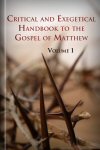
Volume one of the Critical and Exegetical Handbook to the Gospel of Matthew covers chapters 1–17 and includes a detailed introduction to the Gospel and person of Matthew. This volume also contains a brief biography of H. A. W. Meyer, as well as a detailed list of exegetical literature Meyer felt was crucial to his studies of the New Testament.
This translation of the famous and masterly commentary by Meyer will be a great help to American students of the New Testament.
—The Churchman
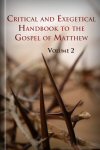
Volume two of the Critical and Exegetical Handbook to the Gospel of Matthew covers chapters 18–28.
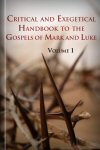
Volume one of the Critical and Exegetical Handbook to the Gospels of Mark and Luke covers the entire Gospel of Mark and Chapters 1–2 of the Gospel of Luke. Each Gospel contains a detailed introduction by Meyer.
In critical acumen and exegetical skill the great German commentator had perhaps no rival. The difficulties of authorship, style and language, harmony with the other Evangels, the spurious ending of Mark's Gospel, and the relation of Luke's Gospel to the Acts of the Apostles, as well as the many textual obscurities that occur in the course of the narratives, required the mastery of 'research, the philological, archaeological, and biblico-theological' experience which Meyer above most exegetes possessed.
—British and Foreign Evangelical Review
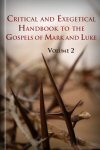
Volume two of the Critical and Exegetical Handbook to the Gospels of Mark and Luke covers chapters 3–24 of the Gospel of Luke.
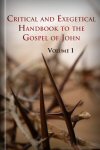
Volume one of the Critical and Exegetical Handbook to the Gospel of John covers chapters 1–7 and includes a detailed introduction to the Gospel and person of John.
Meyer's work is a noble monument of theological learning and industry, inexpressibly superior to any similar work at present existing in the English language.
—The Theological Review
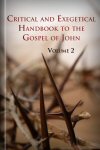
Volume two of the Critical and Exegetical Handbook to the Gospel of John covers chapters 8–21. Also included is a list of commentaries on the Gospel of John that Meyer felt were integral to his studies.
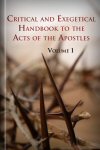
Volume one of the Critical and Exegetical Handbook to the Acts of the Apostles covers chapters 1–12 and includes a detailed introduction and a list of exegetical works that Meyer felt were integral to his studies of the Acts of the Apostles.
Meyer's Commentary on the New Testament is deservedly considered one of the best. In its present form we consider it decidedly one of the very best commentaries on the Acts of the Apostles within the reach of English readers. It should find a place in every minister's library.
—The Reformed Quarterly Review
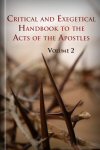
Volume two of the Critical and Exegetical Handbook to the Acts of the Apostles covers chapters 13–28.
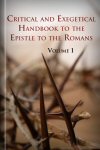
Volume one of the Critical and Exegetical Handbook to the Epistle to the Romans covers chapters 1–7 and includes a detailed introduction and a list of exegetical works that Meyer felt were integral to his studies of the Pauline Epistles.
The scholarship of Christendom has produced no better commentary on the New Testament than Meyer's.
—The Homiletic Review
This volume on the Romans has in every way confirmed our estimate of Meyer's trustworthiness as a guide in his own department of labor. Meyer evidently made it his aim to ascertain the literal historical sense of Holy Scripture, without bias either from personal thoughts and speculations, or from dogmatic and ecclesiastical prepossessions. The labor bestowed on the work must have been immense. Every sentence seems to have been subjected again and again to a thorough and painstaking revision, and nothing which could ensure accuracy and comprehensiveness has been neglected. A more important aid to Biblical criticism than the translation of Meyer could not be rendered.
—The Baptist Magazine
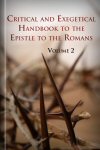
Volume two of the Critical and Exegetical Handbook to the Epistle to the Romans covers chapters 8–16.
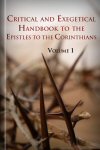
Volume one of the Critical and Exegetical Handbook to the Epistles to the Corinthians covers the first Epistle, chapters 1–13, and includes a detailed introduction and a list of exegetical works that Meyer felt were integral to his studies of the Epistles to the Corinthians.
Meyer's commentary is, in our opinion, one of the very best. It represents a careful and accurate study of the meaning of the text, with a due but not excessive regard to the niceties of the Greek grammar; and it gives evidence of a desire on the part of the author to ascertain the precise teaching of the original. Meyer aims only at bringing out the sense and explaining the principle underlying each passage.
—The Churchman
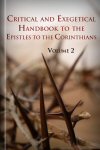
Critical and Exegetical Handbook to the Epistles to the Corinthians, vol. 2
- Author: Heinrich August Wilhelm Meyer
- Translators: William P. Dickson, William Stewart, D. Douglas Bannerman, and David Hunter
- Publisher: T. & T. Clark
- Publication Date: 1879
- Pages: 514
Volume two of the Critical and Exegetical Handbook to the Epistles to the Corinthians covers the first Epistle, chapters 14–16, and the entire second Epistle of Paul to the Corinthians.

The Critical and Exegetical Handbook to the Epistle to the Galatians includes a detailed introduction and a list of exegetical works that Meyer felt were integral to his studies of the Epistle to the Galatians.
This book will be prized as invaluable, especially by the thoughtful and scholarly students of the Scriptures.
—The Evangelical Magazine and Missionary Chronicle
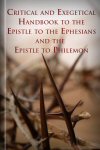
The Critical and Exegetical Handbook to the Epistle to the Ephesians and the Epistle to Philemon includes a detailed introduction and a list of exegetical works that Meyer felt were integral to his studies of these two Pauline epistles.
The Handbook to the Epistles to the Ephesians and Philemon is the last of Meyer's own contributions to the magnum opus of his life. His commentary is—within its prescribed limits—unrivalled. No Biblical scholar has done so much as he to set before us the exact meaning of the sacred text apart from all critical and dogmatical prepossessions. His philological accuracy, his exegetical tact, his profound intuition, allied as they are with stern loyalty to the truth, have placed his volumes in the very foremost rank, and it will be long before they are equaled by the productions of a later day. They form a 'monument of gigantic industry and immense erudition,' and that one man should have been able to accomplish so much, and to accomplish it so well, is, to our thinking, marvelous.
—The Baptist Magazine

The Critical and Exegetical Handbook to the Epistles to the Philippians and Colossians includes a detailed introduction and a list of exegetical works that Meyer felt were integral to his studies of these two Pauline epistles.
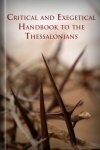
The Critical and Exegetical Handbook to the Epistle of St. Paul to the Thessalonians includes a detailed introduction and a list of exegetical works that Lünemann felt were integral to his studies of this Pauline epistle.
Dr. Lünemann, who writes on the Thessalonians, was regarded by Meyer himself as an able and worthy coadjutor. His notes are of great value.
—The Baptist Magazine
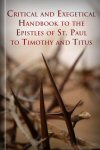
The Critical and Exegetical Handbook to the Epistles of St. Paul to Timothy and Titus includes a detailed introduction and a preface by Huther where he recounts his close personal and working relationship with H. A. W. Meyer.
In the preface to the first of these two volumes, Dr. Huther pays a tribute of admiration to the great learning, conscientiousness, and reverence of Dr. Meyer. The introduction is very ample, extending to more than seventy pages. It amply discusses all questions pertaining to the authorship, character, and contents of the Pastoral Epistles. Dr. Huther is a cautious and well-balanced commentator, and the two volumes are worthy of the series in which they find a place.
—The British Quarterly Review

The Critical and Exegetical Handbook to the Epistle to the Hebrews includes a detailed introduction and a list of exegetical works that Lünemann felt were integral to his studies of this Pauline epistle.
Lünemann on Hebrews has long been known to us in its German form, and from the time of its original publication it took rank as one of the most careful and learned of extant grammatical commentaries on this portion of Scripture.
—The United Presbyterian Magazine

The Critical and Exegetical Handbook to the General Epistles of Peter and Jude includes detailed introductions to all three epistles.
Dr. Huther's commentaries on the Pastoral Epistles of St. Paul have made him well known, and we hail the volumes on the General Epistles of Peter, James, and Jude with great satisfaction.
—Evangelical Magazine and Missionary Chronicle

The Critical and Exegetical Handbook to the General Epistles of James and John includes detailed introductions to all four epistles.
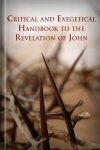
The Critical and Exegetical Handbook to the Revelation of John includes a detailed introduction and a list of exegetical works that Düsterdieck felt were integral to his research. Translator Henry Jacobs' additional comments at the end of each chapter, which sometimes contradict or challenge Düsterdieck, intelligently add to the discussion of this difficult book of the Bible.
A close, critical, and technical study of the Apocalypse.
—The Chautauquan
H. A. W. Meyer was born in Gotha on January 10th, 1800. He married in 1833, one year after publishing his first commentary on the New Testament. He ministered for multiple churches over his life, including pastorates in Othausen, Harste, Hoya, and Hannover. An avid early riser and walker, Meyer would keep the same routine for over fifty years: waking at 4 a.m. to study and write while smoking his pipe, then a three to four mile walk, then off to church to perform his duties as superintendant. After work he was a dedicated family man, and when his son was grown and had children of his own, he described Meyer not as a grandparent, but as a "playmate" of his grandchildren.
Meyer finished sixteen volumes of his New Testament commentary, although all sixteen underwent numerous revisions and rewritings—he worked on them consistently from age 27–72. The last year of his life he battled illness, though he still took his daily walks until the last bedridden month. He died on June 21, 1873. On the cross at his tomb are placed the words from Romans 14:8: "If we live, we live to the Lord, and if we die, we die to the Lord; so then, whether we live or whether we die, we are the Lord’s. "
Reviews
14 ratings
Tony Byrne
5/21/2023

SEONGJAE YEO
10/5/2019
Daniel Ho Kong Yew
11/11/2017

Debra W Bouey
3/28/2017

Whyndell Grizzard
1/1/2014

Larry Proffitt (I
11/13/2013

Faithlife User
11/1/2013

Bill Shewmaker
10/8/2013
Eduardo Vega
9/25/2013